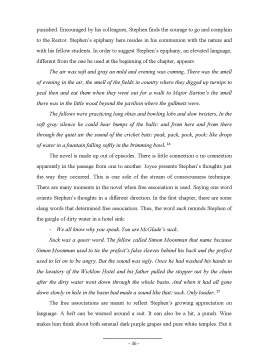Extras din proiect
Chapter One
Disintegration characterizes this time and thus uncertainty, nothing stands firmly on its feet or on a hard faith in itself, one lives for tomorrow, for the day after tomorrow is dubious. Everything in or world is slippery and dangerous, and the ice that still supports us has become thin: all of us feel warm, uncanny breath of twaining wind: where we still walk, no one will be able to walk.1
Nietzsche, 1884
The term MODERN characterizes the late 19th century and the first of the 20th century. It is a key-concept shared by the western world no longer successive, but simultaneous, who was confronted during this period with important imperialist changes, enormous advances in science, the communist revolution crises in capital economy, the rise of fascism and who had to go through two world wars. These crises within the political, economic, social life determined important changes within the cultural area.
But these situations of crisis did not appear out of nowhere. Their roots can be found in the era that preceded the modernity, which is the Victorian era. It is important to mention that the main factor imposed during the Victorian age is Queen Victoria who reigned during almost the entire period. Queen of Great Britain and Ireland, Victoria managed to impose a certain state of facts during her times. Thus the English society was one of very clear cut class-distinctions:
- the working class powerful in number and efficient in organization often accepted compromise driven by a feeling of loyalty to the representative system (The monarchy).
- There was an unusual balance kept between the individual and the collective, between loyalty and constraint, between the individualism and the pressure of consensus. Everything that mattered was related to the idea of community. This state is called the public sense of significance - a complete reliance of the values of society which is not only made to measure one’s actions but also a process that shapes lives.
These were mainly the factors that kept the British Empire going. It was this period when it reached its highest point. In 1883, the Surley’s Expansion of England proclaimed the Imperial Mission. By 1900, the Empire had reached nearly 13,000,000 square miles and 370,000,000 people; the colonies were being used as sources of raw material, markets and incomes, and outlets for emigration.
The English world becomes more and more an industrialized one. The culminating period is represented by the Great Exhibition in London in 1851. All greatest achievements of the world are presented within the Exhibition. This is the symbol of the climax of the Victorian society. Surpassing the angry 40’s, this decade was called the fabulous 50’s.
Starting from this point the technology develops amazingly. The new born individual called Home Britanicus becomes the creator of the first industrial society, the representative of the age of the machine, of an age of ethic and moral ambition. This industrial-technical development will determine another important fact:
The English society becomes more and more urbanized. There emerges a great emigration from the rural to the urban.
In a single generation come the motor-car, wireless telegraphy and the conquest of the air and the of world under the sea. Such inventions, and the application on a colossal scale of older processes of steam and electricity, were perpetually transmuting the economic, social, and international fabric before if had time to solidify; speed and mechanism destroyed the older habits of life and thought in our island, and began the suburbanization of the rural landscape.2
This depression of the agriculture during the 1870-1902 period affected the landed aristocracy and the agricultural laborer. It represented the end of the rural England. England – became a preponderantly urban society. During the same period an important growth in the number of population also occurred. This in 1911 nearly 80 percent from the global population of 45 million inhabitants of the United Kingdom lived in England and Wales, which denotes a great density of population. Out of these 80 percent came to live in the urban districts. It is also important to mention that in forty years the population increased with fourteen million inhabitant and 150,000 agricultural labors disappeared.
Preview document
Conținut arhivă zip
- Modernism.doc













































































